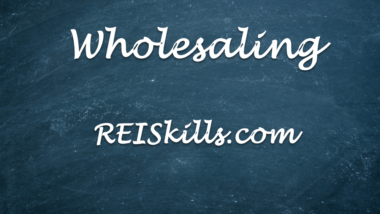Wholesaling Real Estate Glossary
A
- ARV (After Repair Value): The estimated fair market value of a property after all repairs and renovations are completed. This is the most important number for determining a property’s potential profit.
- Assignment of Contract: The primary method used in wholesaling. The wholesaler (the “assignor”) transfers their rights and obligations of the purchase contract to an end-buyer (the “assignee”) for a fee.
- Assignor: The person (the wholesaler) who transfers a contract to someone else.
- Assignee: The person (the cash buyer) who receives the rights and obligations of a contract from the assignor.
B
- Bird Dog: A person who finds distressed properties for an investor or wholesaler for a finder’s fee. They do not negotiate or put the property under contract themselves.
- Buy Box: A wholesaler’s specific criteria for a potential deal, including target ARV, repair costs, neighborhood, and desired profit margin.
C
- Cash Buyer: An investor who purchases properties with cash, often for the purpose of rehabbing (“flipping”) or holding as a rental. This is the target customer for a wholesaler.
- Cash Buyer List: A wholesaler’s curated list of verified real estate investors who have the cash and are ready to purchase properties quickly.
- Closing: The final step in a real estate transaction where the property title is transferred from the seller to the buyer, and funds are disbursed.
- Closing Costs: Fees associated with the sale of a property, paid at closing. These can include title insurance, escrow fees, and transfer taxes. In a wholesale deal, the end-buyer typically pays these.
- Comps (Comparables): Recently sold properties that are similar to the subject property in size, condition, location, and features. Used to determine the ARV.
D
- Direct Mail: A marketing strategy where wholesalers send letters or postcards to a targeted list of motivated sellers (e.g., absentee owners, probate, pre-foreclosure).
- Double Closing (or Simultaneous Closing): A wholesale method where the wholesaler technically purchases the property and then immediately resells it to the end-buyer in two separate, back-to-back transactions. This is often used when an assignment fee is not allowed or desired.
- Driving for Dollars: The practice of driving through neighborhoods to find potentially distressed or vacant properties that are not listed on the market, then researching the owner’s contact information.
E
- EMD (Earnest Money Deposit): A deposit made by a buyer (the wholesaler) to a seller to show “good faith” that they are serious about purchasing the property. This is typically held in escrow and is at risk if the buyer fails to close without a valid contingency.
- Equity: The difference between a property’s fair market value and the amount still owed on its mortgage(s). A homeowner with a $200,000 house and a $150,000 mortgage has $50,000 in equity.
F
- Flip: The process of buying a property, renovating it, and selling it quickly for a profit. Wholesalers “flip” the contract, not the property itself.
H
- Hard Money Lender: A private lender that provides short-term loans based primarily on the property’s value (the “hard” asset) rather than the borrower’s credit. Often used by rehabbers who buy from wholesalers.
L
- Lead: A potential motivated seller who has expressed interest or fits the criteria for a wholesaler’s marketing.
- Lien: A legal claim against a property for the payment of a debt. A property must typically have all liens cleared before it can be sold.
M
- MAO (Maximum Allowable Offer): The highest price a wholesaler can offer a seller and still make a profit. The standard formula is: MAO = (ARV x 70%) – Repair Costs – Desired Profit.
- Marketing: The various strategies wholesalers use to find motivated sellers, including direct mail, bandit signs, cold calling, and online ads.
- Motivated Seller: A property owner who has a strong reason to sell quickly, often below market value. Reasons can include foreclosure, divorce, inherited property, or major repairs needed.
O
- Off-Market Property: A property for sale that is not listed on the Multiple Listing Service (MLS). Wholesalers deal almost exclusively in off-market properties.
P
- Proof of Funds (POF): A document from a bank or lender verifying that a buyer (the wholesaler) has the financial capacity to purchase a property. Wholesalers typically get this from their hard money lending partners or private investors to show to sellers.
- Purchase Agreement: The legal contract between the seller and the wholesaler that outlines the terms of the sale, including price, closing date, and contingencies.
R
- Rehab: The process of repairing and renovating a property.
- REO (Real Estate Owned): A property that is owned by a bank or lender, typically after a failed foreclosure auction.
S
- Subject-To (or “Sub2”): A purchasing strategy where the buyer takes over the seller’s existing mortgage payments without the loan being formally paid off. The original loan remains in the seller’s name. This is a more advanced strategy but can be used in wholesaling.
- Sweat Equity: The increase in a property’s value resulting from the owner’s (or investor’s) direct labor and effort, rather than from outside market forces.
T
- Title Company: A neutral third party that facilitates the closing process, ensures the title is clear, and disburses funds.
- Turnkey: A renovated property that is fully ready for a tenant to move into. Some cash buyers on a wholesaler’s list may be looking for turnkey rental properties.
V
- Vacant Property: A property with no one living in it. This is a key indicator for wholesalers when “driving for dollars,” as it often signals a motivated seller.
W
- Wholesale Fee: The profit a wholesaler makes for finding the deal and assigning the contract. It is the difference between the price in the contract with the seller and the price the end-buyer pays.
- Wholesaling: A real estate investment strategy where an investor (the wholesaler) secures a property under contract and then assigns that contract to a cash buyer for a fee, without ever taking ownership of the property.


